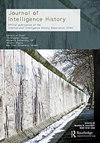英国在战壕中的信号情报,1915-1918:第2部分,翻译操作员
引用次数: 1
摘要
摘要本文运用韵律图技术对大约150名第一次世界大战信号情报人员进行了调查。这些讲德语的人被英国军队指定为“口译员操作员”,他们收听从电话线泄露或故意通过地面传输的敌方和友军信息。这些人来自不同的民族志背景,他们提供了一个引人入胜的案例研究,讲述了一支军队利用语言技能支持他们的军事努力。他们还强调了所有情报机构面临的一个矛盾的挑战;为了了解对手,你必须经常雇佣那些与对手有密切个人或家庭关系的人。本文章由计算机程序翻译,如有差异,请以英文原文为准。
British signals intelligence in the trenches, 1915–1918: part 2, interpreter operators
ABSTRACT This article uses prosopographical techniques to examine around 150 First World War signals intelligence personnel. Designated as ‘Interpreter Operators’ by the British army, these German-speakers listened to enemy and friendly messages that had leaked from telephone lines or were deliberately transmitted through the ground. Drawn from diverse ethnographic backgrounds, these men offer up a fascinating case study of an army harnessing language skills to support their military endeavours. They also highlight a paradoxical challenge facing all intelligence organisations; that in order to understand an opponent you must often employ those with close personal or familial connections to that enemy.
求助全文
通过发布文献求助,成功后即可免费获取论文全文。
去求助
来源期刊

Journal of Intelligence History
Arts and Humanities-History
CiteScore
0.50
自引率
0.00%
发文量
21
期刊介绍:
The Journal of Intelligence History is the official publication of the International Intelligence History Association (IIHA). It is an international peer-reviewed journal that aims to provide a forum for original research on the history of intelligence services, activities and their wider historical, political and social contexts. The journal aims to publish scholarship on all aspects of the history of intelligence, across all continents, countries and periods of history. We encourage submissions across a wide range of topics, methodologies and approaches.
 求助内容:
求助内容: 应助结果提醒方式:
应助结果提醒方式:


